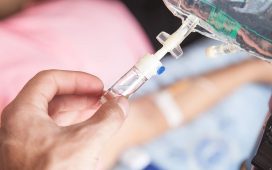Volunteer peer leader program linked to lasting improvements in HbA1c, fewer depressive symptoms
MONDAY, May 7, 2018 (HealthDay News) — A community health worker (CHW)-led diabetes self-management education (DSME) program is associated with sustained improvement in hemoglobin A1c (HbA1c), according to a study published online April 27 in Diabetes Care.
Michael S. Spencer, Ph.D., from the University of Michigan in Ann Arbor, and colleagues randomized 222 Latino adults with type 2 diabetes and poor glycemic control to a CHW-led, six-month DSME program or enhanced usual care (EUC). Participants randomized to the CHW-led DSME were further randomized after the program to 12 months of CHW-delivered monthly telephone outreach or 12 months of weekly group sessions delivered by peer leaders (PLs; CHW+PL).
The researchers found that at the six-month follow-up, compared with EUC, participants in the CHW intervention had greater decreases in HbA1c (−0.45) and in diabetes distress (−0.3). Improvements in HbA1c were maintained at 12 and 18 months in CHW+PL participants; CHW-only participants maintained improvements in diabetes distress at 12 and 18 months. Compared with EUC, CHW+PL participants also had significantly fewer depressive symptoms at 18 months (−2.2). Relative to EUC, participants in CHW-led DSME had significant improvements in diabetes social support and in understanding of diabetes self-management at six months; these effects were not maintained at 18 months.
“This study demonstrates the effectiveness of a six-month CHW intervention on key diabetes outcomes and of a volunteer PL program in sustaining key achieved gains,” the authors write.
Copyright © 2018 HealthDay. All rights reserved.








